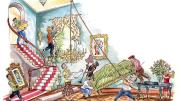1933
Harvard University Press issues phonograph records of “four widely known Harvard voices”: T.S. Eliot ’10 and professors Charles Townsend Copeland, Fred Norris Robinson, and Bliss Perry.
1943
The president of The Harvard Advocate announces that, due to lack of finances and manpower, the forthcoming issue will be the last for the duration of the war. The organization will, however, continue its “social function.”
1953
The editors note that Anne (Woodward) Pusey, the University’s new first lady, is overseeing the redecorating of 17 Quincy Street, the President’s House, and “[d]oing much of it herself”—a “job that few American housewives would dare to tackle.”
1963
The University comptroller’s office shifts from a card-processing system to a card-and-magnetic-tape system that can add 200,000 eight-digit numbers a minute (up from 150); the registrar, College Fund, personnel and financial aid directors, and other offices also plan to use the new equipment.
1973
Two construction projects reshape the Yard: demolition of Hunt Hall to make room for a new freshman dormitory (the future Canaday Hall), and excavation of the Pusey Library site.
Citing more than 20 deficiencies, the Department of Health, Education, and Welfare criticizes Harvard’s affirmative action plan, specifically the dearth of “a department-by-department breakdown of goals and timetables for the hiring of minorities and women in the Faculty of Arts and Sciences.”
1978
Exiled Russian writer Alexander Solzhenitsyn is awarded an honorary degree. In his speech, he warns that “the Western world is losing its courage and spiritual direction.”
2008
A $100-million gift from David Rockefeller ’36, G ’37, LL.D. ’69, underwrites undergraduate international experiences and study centers in the Harvard Art Museums when the Fogg is renovated.









